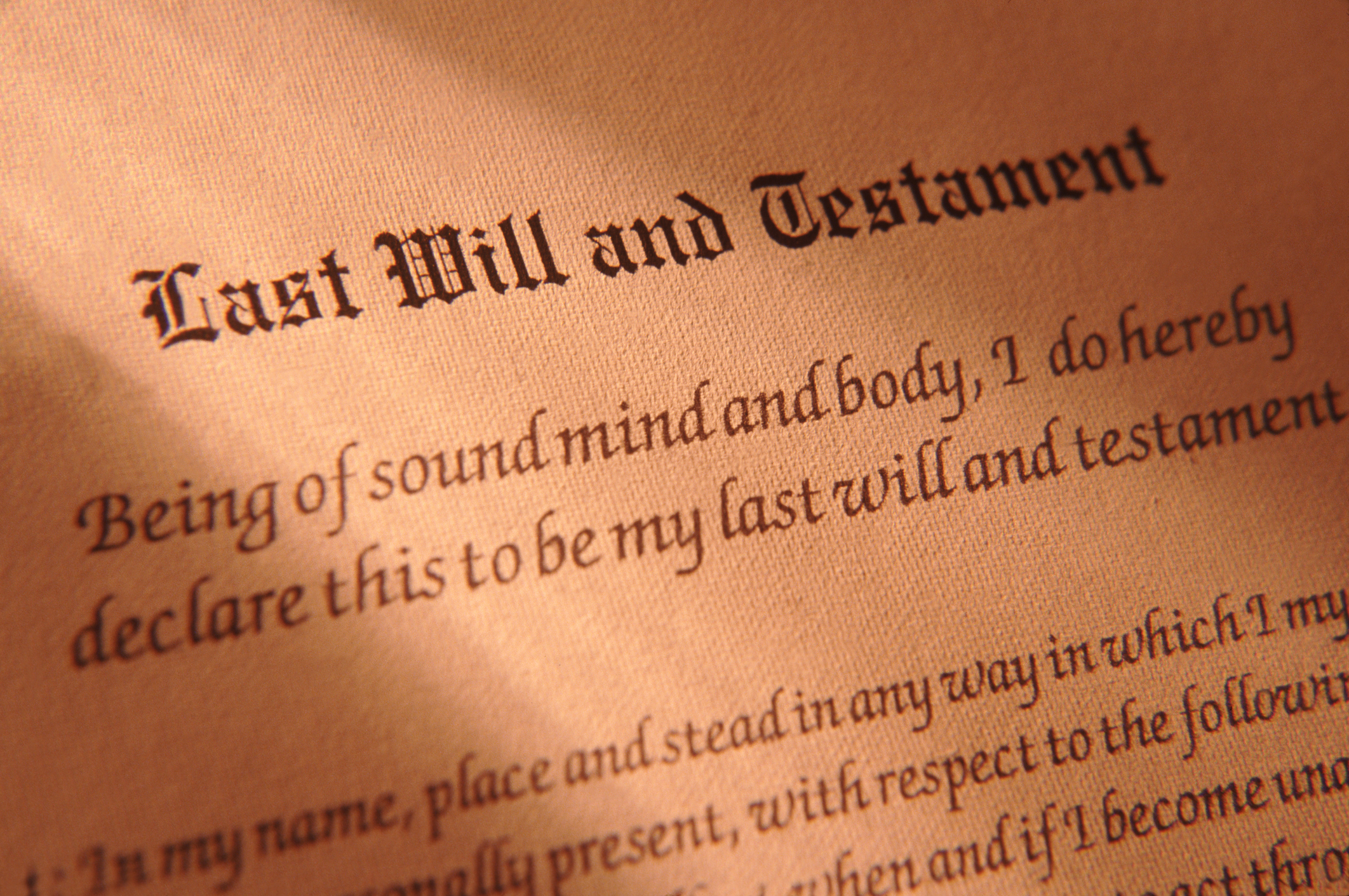Protect Your Loved Ones With an Estate Plan
Here are eight things you can do to help protect your family.


Profit and prosper with the best of Kiplinger's advice on investing, taxes, retirement, personal finance and much more. Delivered daily. Enter your email in the box and click Sign Me Up.
You are now subscribed
Your newsletter sign-up was successful
Want to add more newsletters?

Delivered daily
Kiplinger Today
Profit and prosper with the best of Kiplinger's advice on investing, taxes, retirement, personal finance and much more delivered daily. Smart money moves start here.

Sent five days a week
Kiplinger A Step Ahead
Get practical help to make better financial decisions in your everyday life, from spending to savings on top deals.

Delivered daily
Kiplinger Closing Bell
Get today's biggest financial and investing headlines delivered to your inbox every day the U.S. stock market is open.

Sent twice a week
Kiplinger Adviser Intel
Financial pros across the country share best practices and fresh tactics to preserve and grow your wealth.

Delivered weekly
Kiplinger Tax Tips
Trim your federal and state tax bills with practical tax-planning and tax-cutting strategies.

Sent twice a week
Kiplinger Retirement Tips
Your twice-a-week guide to planning and enjoying a financially secure and richly rewarding retirement

Sent bimonthly.
Kiplinger Adviser Angle
Insights for advisers, wealth managers and other financial professionals.

Sent twice a week
Kiplinger Investing Weekly
Your twice-a-week roundup of promising stocks, funds, companies and industries you should consider, ones you should avoid, and why.

Sent weekly for six weeks
Kiplinger Invest for Retirement
Your step-by-step six-part series on how to invest for retirement, from devising a successful strategy to exactly which investments to choose.
I recently attended two memorial services for people I had known for a long time. As much as their passing saddened me, I took the opportunity to reflect on and appreciate their impact on my life. I also realized how much they meant not only to their families but also to their communities. They were beloved spouses, parents, siblings and influential community members.
Although I knew these people socially, I did not know their financial situations. As I witnessed the families’ grief, I hoped they had estate plans, which minimize the stress and burden of loved ones during a sad and challenging time. An estate plan helps you clearly outline your wishes, allows your family to understand and carry out your intentions and reduces family conflict. Having an estate plan in place is like giving a gift to your family.
Following are things you can do to help protect your family:
From just $107.88 $24.99 for Kiplinger Personal Finance
Become a smarter, better informed investor. Subscribe from just $107.88 $24.99, plus get up to 4 Special Issues

Sign up for Kiplinger’s Free Newsletters
Profit and prosper with the best of expert advice on investing, taxes, retirement, personal finance and more - straight to your e-mail.
Profit and prosper with the best of expert advice - straight to your e-mail.
Inventory your assets
Record all of the assets you own, such as your bank, investment and online accounts, real estate, etc., on a spreadsheet or, better yet, an online app. And don’t forget to inventory your online assets, which are often forgotten about, as people may not view these as assets. These can include fractional assets or cryptocurrency, among others. Make sure that your family can access this information.
Prepare a will
This is an excellent way to start your estate plan. A will outlines how you want your assets distributed to your loved ones and allows you to appoint a guardian for your minor children. You can also name a person to carry out your estate plan.
Prepare a health directive
This document provides direction on how you would like to be cared for if you are incapacitated. Many health plans can help with forms to prepare this important document, or you can set up your document via a website.
Create a power of attorney document
This is another essential document that allows someone to make financial decisions on your behalf should you become incapacitated or can no longer handle your financial affairs.
Establish a trust
This legal document allows your estate to avoid probate, a lengthy and costly process to settle an individual’s estate. A trust also allows you to distribute your assets to your beneficiaries in many more ways than a will can accomplish. However, preparing a trust costs much more than a will, and your estate may not need a trust. You should discuss your situation with an estate planning attorney.
Consider a TOD
A TOD (which stands for transfer on death) is a designation you can add to an investment or bank account. This type of designation typically avoids probate, allowing the account to pass to a beneficiary upon your death. You should coordinate this with your will or trust.
Communicate with your family
An essential component of estate planning is having a family meeting to discuss where your documents are, who your financial advisor and attorneys are and any other information you think your loved ones should know.
You may be hesitant to discuss your eventual death or incapacity with your children, but not knowing some of the details can mean assets can get lost and may not get passed on to your family. An honest conversation can reduce your family’s anxiety about the future and teach them another component of financial responsibility.
Periodically review and update your estate planning documents
Life events such as marriage, divorce and changes in family dynamics are critical times to review the documents you have prepared. Additionally, significant changes in your assets or potential tax changes are another time to review your documents. Be sure to provide updated documents to all trustees, successor trustees, executors and your family.
A properly executed and communicated estate plan is essential to protect your loved ones. You should review your situation with an estate planning attorney to ensure you have covered all aspects of your estate plan. Knowing you have done everything you can to ease your loved ones' burden should provide you peace of mind.
Related Content
- Why You Need an Advance Directive
- How to Organize Your Financial Paperwork for Your Heirs
- Revocable vs. Irrevocable Trusts: What You May Not Know
- Eight Common Estate Planning Mistakes
The information provided here is not investment, tax or financial advice. You should consult with a licensed professional for advice concerning your specific situation.
Profit and prosper with the best of Kiplinger's advice on investing, taxes, retirement, personal finance and much more. Delivered daily. Enter your email in the box and click Sign Me Up.

Mario R. Hernandez, Principal at Longevity Wealth Management, has been a Certified Financial Planner (CFP®) since 1994 and brings a vast amount of experience in the financial planning and investment management business. Mario previously headed up the wealth management division at Gemmer Asset Management LLC and provided clients with holistic planning and helped prepare them for retirement.
-
 The New Reality for Entertainment
The New Reality for EntertainmentThe Kiplinger Letter The entertainment industry is shifting as movie and TV companies face fierce competition, fight for attention and cope with artificial intelligence.
-
 Stocks Sink With Alphabet, Bitcoin: Stock Market Today
Stocks Sink With Alphabet, Bitcoin: Stock Market TodayA dismal round of jobs data did little to lift sentiment on Thursday.
-
 Betting on Super Bowl 2026? New IRS Tax Changes Could Cost You
Betting on Super Bowl 2026? New IRS Tax Changes Could Cost YouTaxable Income When Super Bowl LX hype fades, some fans may be surprised to learn that sports betting tax rules have shifted.